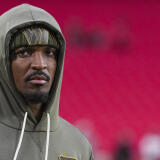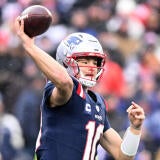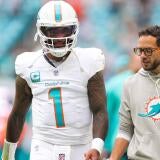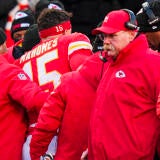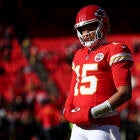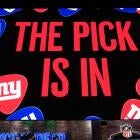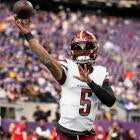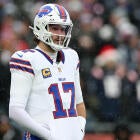Micah Parsons to Packers: Was trade from Cowboys biggest in NFL history? Here are five that may be bigger
These are the biggest trades involving superstar players
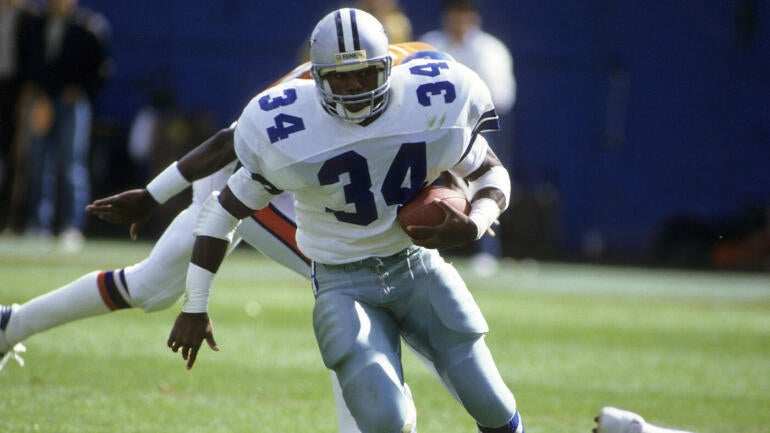
The unthinkable actually happened between Micah Parsons and the Dallas Cowboys. Dallas traded its generational superstar to the Green Bay Packers on Thursday night for nose tackle Kenny Clark and two first-round picks, a blockbuster deal involving a generational player in today's NFL.
Time will tell who wins or loses the trade, or if Parsons can deliver a Super Bowl to Green Bay. The four-year, $188 million extension Parsons signed was a bigger indicator of Green Bay's willingness to give Parsons his extension than Dallas deciding to not pay its superstar.
Trading Parsons to the Packers is one of the biggest deals in NFL history, one that will stand up against the test of time. The NFL has experienced significant deals in the past that have altered the landscape of the league, but were any as monumental as Parsons to the Packers?
There have been several major trades that this Parsons deal can rival, especially since two of the league's most historic franchises in the Cowboys and Packers were involved. These are some blockbuster trades involving superstars in the Super Bowl era that had the impact of this Parsons deal, and how the team that traded the superstar fared.
Randy Moss to Patriots
- Patriots receive: Randy Moss
- Raiders receive: 2007 fourth-round pick
In what is one of the biggest heists in NFL history, the Patriots had a zero-tolerance policy under Bill Belichick that worked when acquiring Moss. Falling out of favor in Oakland and causing problems on and off the field, the Patriots took a gamble and dealt a Day 3 pick for Moss -- who was coming off a season where he had 42 catches for 553 yards and three touchdowns.
Moss was dominant in Year 1 with New England. At the age of 30, Moss had 98 catches for 1,493 yards and 23 touchdowns -- which is still an NFL record for most receiving touchdowns -- as the Patriots went 16-0 in the regular season and went to Super Bowl XLII. Moss had 47 receiving touchdowns in his first three seasons in New England, solidifying a Hall of Fame career.
The Raiders selected John Bowie with the fourth-round pick. He played five career games in three seasons.
Eric Dickerson to Colts
- Colts receive: Eric Dickerson
- Rams receive: Greg Bell, Owen Gill, 1988 first-round pick (from Bills), 1988 first-round pick (from Colts), 1988 second-round pick (from Colts), 1988 second-round pick (from Colts), 1989 first-round pick (from Bills), 1989 second-round pick (from Colts), 1989 second-round pick (from Bills)
- Bills receive: Rights to Cornelius Bennett
A blockbuster trade of Halloween in 1987 resulted in Dickerson leaving Los Angeles for Indianapolis, the largest trade among players and draft picks since 1971. The Rams and Dickerson were in a contract stalemate (sound familiar) and Dickerson believed he was underpaid.
After playing just three games in the strike-shortened 1987 season, the Rams dealt Dickerson to the Colts and received two running backs and nine draft picks from the Colts and Bills to make the trade work.
The Colts and Bills immensely benefited from the Dickerson trade, as Bennett was a key piece on the Bills teams that went to four Super Bowls from 1990 to 1993. Bennett made five Pro Bowls and was an All-Pro in 1988, finishing with 52.5 sacks in his nine seasons in Buffalo.
Dickerson was a star in Indianapolis, rushing for 1,011 yards and five touchdowns in his first nine games with the Colts. Indianapolis rallied to make the playoffs that season, and Dickerson rushed for 1,659 yards and 14 touchdowns in 1988 -- leading the league in rushing and earning first-team All-Pro honors. He rushed for 5,194 yards and 32 touchdowns in 61 games with the Colts.
Bell led the league in touchdowns twice with the Rms and rushed for 2,375 yards and 31 touchdowns in his two seasons there. The key players in the trade each worked out for their respective teams.
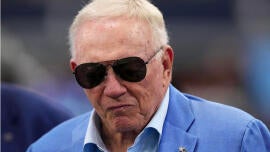
Joe Montana to Chiefs
- Chiefs receive: Joe Montana, David Whitmore, 1993 third-round pick
- 49ers receive: 1993 first-round pick
The greatest quarterback in 49ers history didn't get to end his career in San Francisco. The 49ers already had Steve Young racking up MVP awards while Montana was working his way back from an elbow injury in his late 30s. San Francisco obviously was going to stick with Young, working with Montana to find a deal that was best for him.
San Francisco made Montana the "designated starter" in an attempt to keep him, days after granting him permission to seek a trade. Montana turned down the Cardinals in favor of the Kansas City Chiefs, but the 49ers nixed the trade to Kansas City. The 49ers actually wanted to accept the Cardinals offer, but Montana didn't want to go there.
Montana agreed to a three-year, $10 million deal with the Chiefs, taking $5 million less than what the Cardinals offered him. The Chiefs tailored the offense to Montana, hiring offensive coordinator Paul Hackett (Montana's former quarterbacks coach in San Francisco) and installed the West Coast offense. The Chiefs won their division for the first time in 22 years as Montana threw for 2,144 yards, 13 touchdowns to seven interceptions for an 87.4 passer rating at 37 years old.
Montana led the Chiefs to back-to-back come-from-behind wins in the playoffs, throwing a touchdown pass on fourth down to send the game to overtime (Chiefs won 27-24). The next week, the Chiefs scored 28 second-half points to win a 28-20 thriller over the Houston Oilers. Kansas City fell in the AFC Championship to the Buffalo Bills, winning more postseason games in the 1993 season than the previous 24 seasons. Montana went to his final Pro Bowl in 1993.
Marshall Faulk to Rams
- Rams receive: Marshall Faulk
- Colts receive: 1999 second-round pick, 1999 fifth-round pick
Faulk was looking to renegotiate his contract after having a league-leading 2,227 yards from scrimmage in 1998. The Colts decided to move on, which Faulk was initially upset with because that ended a short tenure with Peyton Manning. Faulk initially held out while his new deal was being negotiated, signing a seven-year, $45.2 million deal with the Rams.
St. Louis cashed in with Faulk, as he arguably was in the midst of the greatest four-year run by any running back in NFL history. Faulk set an NFL record in yards from scrimmage in a season (2,429) in 1999 -- as the Rams were dubbed "The Greatest Show on Turf" en route to the Super Bowl XXXIV title. Faulk finished in the top two in MVP voting for three consecutive years, winning Offensive Player of the Year in all three years. He had 6,765 yards from scrimmage and 59 scrimmage touchdowns from 1999 through 2001, as the Rams made two Super Bowls in three years while Faulk was a first-team All-Pro three times.
Faulk was the best player on "The Greatest Show on Turf," becoming one of the greatest all-purpose backs ever.
Herschel Walker to Vikings
- Vikings receive: Herschel Walker, 1990 third-round pick, 1990 10-round pick, 1991 third-round pick
- Cowboys receive: Jesse Solomon, David Howard, Issiac Holt, Alex Stewart, 1990 first-round pick, 1990 second-round pick, 1990 third-round pick, 1991 first-round pick, 1991 second-round pick, 1992 first-round pick, 1992 second-round pick, 1992 third-round pick
The defining trade of the Cowboys dynasty in the 1990s was what they were able to do with the picks they received for Walker, as this 18-player deal is the largest in NFL history. Dallas took a calculated risk in trading Walker, as owner Jerry Jones and coach Jimmy Johnson valued the draft picks over the players they received.
Some of the draft picks obtained by the Cowboys in the trade turned into Emmitt Smith, Russell Maryland, Kevin Smith, and Darren Woodson -- all key players for the team that won three Super Bowls in four years in the 1990s. Perhaps Jones thinks he can do this again with Parsons, but the Cowboys were a more stable franchise 36 years ago (even with a 1-15 record in 1989).
Dallas was criticized for the Walker move initially, as he was the Cowboys' best player. Walker was coming off consecutive Pro Bowl seasons, including rushing for 1,514 yards in 1988. Walker never had a 1,000-yard season with the Vikings, rushing for 2,264 yards and 20 touchdowns in 42 games. He had just one more 1,000-yard season in his career, with the Eagles in 1992.
The Cowboys clearly won this trade, because they hit on their picks. Dallas traded a good player in his prime and got significantly rewarded. Walker wasn't a generational player in 1989 like Parsons is in 2025, but the Cowboys got more for Walker.


